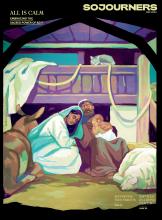Share As A Gift
Share a paywall-free link to this article.
This feature is only available for subscribers.
Start your subscription for as low as $4.95. Already a subscriber?

Illustrations by Jocelyn Reiter
THE FERVOR AT church during the Advent season is a remarkable sight. Both clergy and laity work like the shepherds, tending to their flocks late into the night. And many move like the wise men, traveling to foreign places and spending extensive resources to celebrate Christ’s arrival with family.
This time of heightened activity makes sense given the story of scripture and the story of our current world. The shepherds could not help but tell others once they learned of the Savior’s birth. And as we now await his return, we shouldwork hard to share the riches of the nativity with a world that is a little more open to matters of faith at this time of year.
But if increased activity is the only melody we pick up from the nativity story told in Matthew and Luke, we neglect a needful counterpoint: the importance of rest. The nativity story is replete with theological, familial, and political lessons about rest that quietly proclaim God’s goodness to this weary world. With exhaustion rampant in the church — perhaps especially so at Christmastime — we would do well to hear notes of rest sounding from the manger.
1. Listen to your sleep
God uses sleep as a vehicle for saving Joseph’s family (Matthew 1:18-25). God instructs Joseph to honor his marriage to Mary because her pregnancy was not a sign of infidelity. To the contrary, it was a sign of immense devotion to God. Furthermore, this miracle child would save all his people, including his parents, from their actual sins, as opposed to their alleged ones. In obedience, Joseph listened to the message heard in his sleep and thus participated in God’s saving of his family.

Got something to say about what you're reading? We value your feedback!